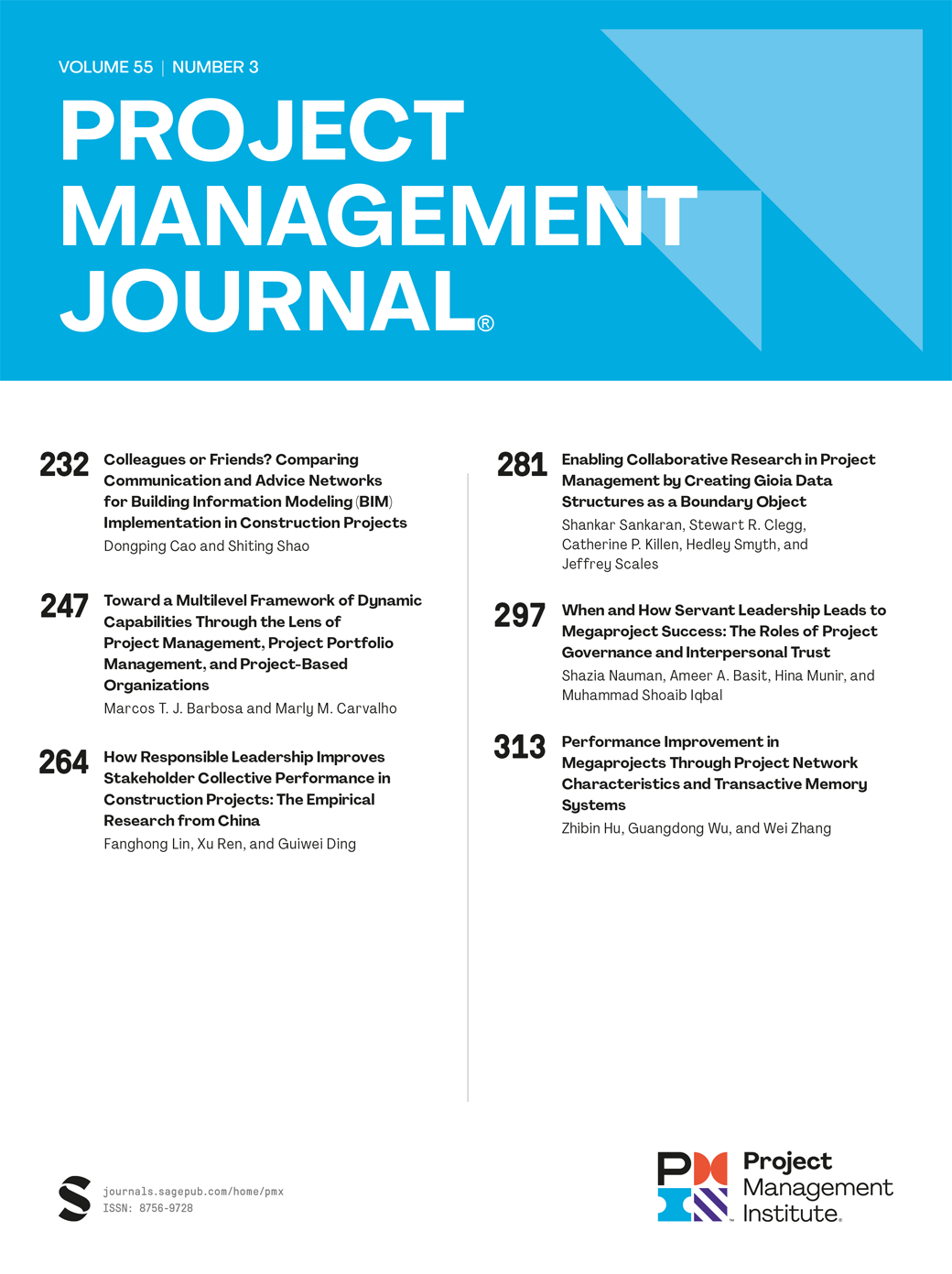Seven Insights Into Becoming an Engaged Project Scholar
IF 5.1
2区 管理学
Q1 MANAGEMENT
引用次数: 0
Abstract
I was invited to write this editorial as a reflective essay on my research, publications, and related work that led to receiving the PMI Research Achievement Award for 2023. I feel humbled, honored, and thankful. As a way of saying thank you to all the people I have met and worked with over the years, I decided to respond to the invitation and write this essay about what I have learned over these years; why I became a “project scholar”; and what I would like to say to early-stage scholars about starting a career in “project studies” (Geraldi & Söderlund, 2018). First, the notion of project studies is an important one with wide-ranging implications. It moves the study of projects and project management into a broader context, into a conversation with scholars and practitioners that are interested in more than just “management.” I believe the idea of project studies very much emerged out of the loosely coupled Scandinavian school of project management research that wanted to move “beyond project management” (Sahlin-Andersson & Söderholm, 2002) and argued for the need for a broad social science approach to capturing contemporary challenges in project society. Of course, the notion of project studies does not mean that project management is unimportant, rather the opposite. It addresses the plurality of contemporary problems that many project managers are facing today; it ignites a broader conversation of the numerous and substantial challenges that we need to address to shape the best projects and implement our projects in a better way. However, the notion of project studies does not only send a message that we need to be mindful about the varying levels of analysis we address (Geraldi & Söderlund, 2016)—we also need to grasp how they interact to create problems, as well as opportunities and solutions to those problems (Sydow et al., 2004). In that regard, among other things, we need to understand how macro developments might have effects on the individual level and how team-level collaborations might create macrolevel changes. The notion of project studies is at the same time an invitation to work and research in even more interdisciplinary ways to emphasize that project-related research is not only a matter for the business school—and the management scholar—it is a matter for the economist, the political scientist, the engineer, the educator, and the psychologist. Project-related research thus needs to be organized in novel ways in new kinds of projects, of course, in better and braver projects, which is natural for any project scholar, but perhaps also in the long run to open up new sorts of permanent institutions that could better address the various challenges of society’s projects. This also underlines the need for closer collaborations with practitioners in a wide range of sectors—with ongoing and fertile conversations with regulators, with shapers of projects, with innovators, and with educators. In that respect, it should pave the way for a new kind of engaged scholarship in project studies. Talking about the field of project-related research and teaching as project studies therefore sends a signal that project scholars are more than management scholars, more than organization theorists, and more than psychologists in our aspirations to develop knowledge about projects. We need to be integrative scholars (cf. Boyer, 1990). Indeed, recently, I have noticed there are more and more openings for jobs as lecturers in “project studies,” which I think is a very positive sign. Such developments obviously invite us to take a serious crossdisciplinary look at and approach to projects at the macro-, meso-, and microlevels (Geraldi & Söderlund, 2018). I think this idea has been running like a common thread through my own work as a researcher—originally based in strategic management but gradually acknowledging a wider range of analysis levels, investigating the people side of projects, the role of the liminal project worker and now, more recently, trying to grapple with the macro issues and elements of projects: the societal developments, grand challenges, and transition challenges, as discussed in a recent paper with Sylvain Lenfle published in Research Policy (Lenfle & Söderlund, 2022). I believe we have only seen the birth of this broader field of project studies, and important calls for novel research into this area are on the way (see, for instance, Geraldi et al., 2020; Winch et al., 2023). We have only recently begun to uncover what we might learn from closer interactions and analyses of the economics of projects, sociology of projects, and psychology of projects as we have seen in several interesting recently published papers in the Project Management Journal (PMJ) (Alzoubi et al., 2023; Barbosa et al., 2022; Farid & Boch Waldorff, 2022; Steen et al., 2022; Troje, 2023). This development, however, also means that project scholars need to publish in other fields and in other journals, which Davies and MacAulay discuss in an interesting thoughtlet成为一名专职项目学者的七个见解
本文章由计算机程序翻译,如有差异,请以英文原文为准。
求助全文
约1分钟内获得全文
求助全文
来源期刊

Project Management Journal
MANAGEMENT-
CiteScore
9.30
自引率
14.00%
发文量
40
期刊介绍:
Project Management Journal (PMJ) is the academic and research journal of the Project Management Institute and features state-of-the-art research, techniques, theories, and applications in project management.
Projects represent a growing population of human activity in large, small, private, and public organizations. Projects are used to execute and sustain today's organizational activities. They play a fundamental role as the engine of tomorrow's innovation, value creation, and strategic change. However, projects often fail to deliver their promise.
PMJ addresses these multiple challenges and opportunities by encouraging the development and application of novel theories, concepts, frameworks, research methods, and designs. PMJ embraces contributions both from within and beyond project management to augment and transform theory and practice.
 求助内容:
求助内容: 应助结果提醒方式:
应助结果提醒方式:


